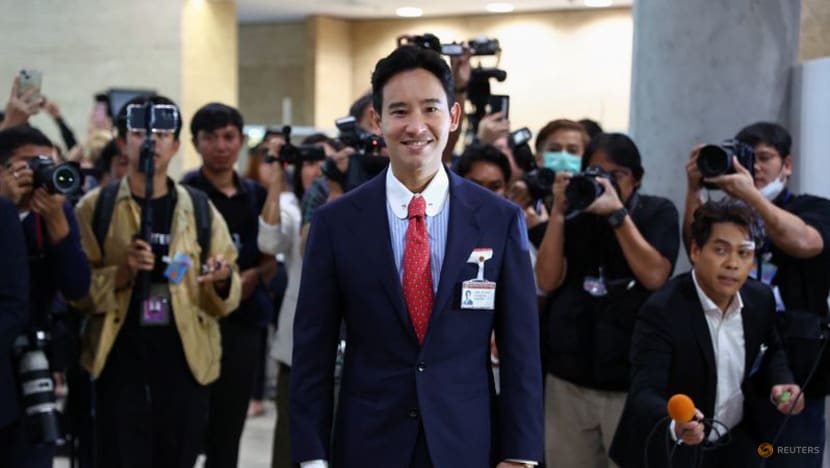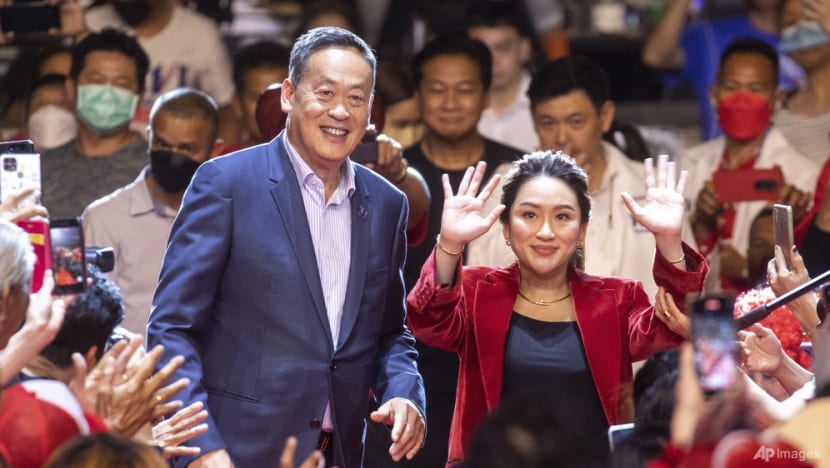Thai PM hopeful ready for premiership revote after defeat
Move Forward Party leader Pita Limjaroenrat will make another attempt to win the premiership as both Houses reconvene on Jul 19.

BANGKOK: Thai prime ministerial hopeful Pita Limjaroenrat is set to continue his fight for the premiership in parliament on Wednesday (Jul 19) after his party won the country’s general election in May but failed to secure the requisite approval from the parliamentarians in a joint sitting last week.
Mr Pita, 42, is expected to be renominated for the position when the House of Representatives and the Senate reconvene to select the 30th prime minister of Thailand.
His Move Forward Party and its seven coalition partners have 312 Members of Parliament (MPs) in the 500-seat Lower House. But for Mr Pita to become prime minister, he needs the mandate from at least 375 parliamentarians – more than half of the combined assembly, which also includes 249 senators in the Upper House.
His initial bid for the premiership on Jul 13 ended in defeat when 381 MPs and senators refused to back him – the sole candidate for the vote.
Mr Pita only managed to garner 324 votes, including 13 from senators, while 182 parliamentarians voted against him and 199 others abstained.
“After Jul 13, we’ve continued with our talks. Many senators did not come to vote on that day. We had opportunities to exchange ideas and discuss that some of them were occupied overseas and whatnot. The possibility of them voting for me is still there,” he said on Monday.
“I’m still fighting.”
However, it remains unclear whether the Move Forward Party leader can be renominated as prime minister.
Speaker of the House of Representatives and president of the Parliament Wan Muhamad Noor Matha said on Tuesday that certain parliamentarians do not support Mr Pita’s renomination for the premiership because he had already been rejected last week.
They claimed a rejected motion cannot be resubmitted for consideration in the same parliamentary session, citing the regulations for parliamentary sitting.
“The other opinion is that the prime ministerial selection is not a general motion but a process to nominate an individual as prime minister, which exists as a separate section in the regulations for parliamentary sitting,” Mr Wan Muhamad explained.
Parliamentarians will be able to debate the issue before he reaches a conclusion.
PITA READY TO BACK PHEU THAI IN CASE HE LOSES
The election on May 14 saw the highest voter turnout in Thailand’s political history. There were about 52 million eligible voters in the polls, and about 39.3 million people – 75.22 per cent – came out to cast their ballots.
The Move Forward Party pulled off a surprise victory with 151 seats in parliament, followed by Pheu Thai with 141 seats.
Still, the electoral winner is struggling to consolidate enough votes for its leader to become the next prime minister, especially from the 249 senators handpicked by the military government of General Prayut Chan-o-cha – Thailand’s caretaker prime minister.
Last week, 159 senators abstained from voting and 43 others did not show up for the prime ministerial vote.
The Move Forward Party has long been critical of the senators’ role in the prime ministerial selection as well as the military’s continued presence in politics.
On Jul 14 - a day after Mr Pita lost his initial bid to be the prime minister - Move Forward Party members submitted a draft Bill to revoke Section 272 of the Thai constitution which empowers the Senate to jointly select the prime minister together with the House of Representatives until May 2024.
Mr Pita said his party is fighting on two battlefields at the same time – to win the premiership on Wednesday and to permanently remove the Senate’s power in selecting the prime minister.
“We won’t be able to win any battle if we can’t convince the senators to stand on the people’s side,” he said in a video clip shared on his social media last Saturday.
In the event his party fails to form the next government, the prime ministerial hopeful said that he is ready to let electoral runner-up Pheu Thai do it instead as long as the party sticks with the eight-party coalition and their mutual agreements.
“Every Move Forward Party MP is ready to support the prime ministerial candidate of the Pheu Thai Party. But until that day comes, we will definitely not give up,” Mr Pita added.
Pheu Thai has three prime ministerial candidates. One of them is Paetongtarn Shinawatra, the youngest daughter of former prime minister Thaksin Shinawatra, who was ousted from power in a military coup in 2006 and currently lives in exile in Dubai, United Arab Emirates.
The others are property tycoon Srettha Thavisin and former attorney-general Chaikasem Nitisiri.
Ms Paetongtarn told local media on Tuesday the party plans to nominate Mr Srettha for the prime minister role if it has to form the government.

Meanwhile, Mr Pita faces possible disqualification of his MP membership after the Election Commission asked the Constitutional Court last week to rule whether it should be terminated.
The termination is related to 42,000 shares of media firm ITV, which were held under his name when he ran in the May election.
According to the Thai constitution, individuals are prohibited from running in an election of Members of the House of Representatives if they are shareholders of any newspaper or mass media business.
Mr Pita claimed he managed the shares on behalf of his family’s inheritance fund. He later transferred them to other heirs.
ITV officially began broadcasting in 1996. It lost the right to use the frequency for broadcasting in 2007 after the Office of the Prime Minister revoked its concession agreement.
Currently, the company and the Office of the Prime Minister are involved in an ongoing legal dispute.
















